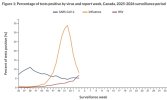Chandelier
Senior Member (Voting Rights)

Healthcare Workers With Long COVID Struggle to Find Support
Some healthcare workers fail to recognize the symptoms of long COVID in themselves, says one physician.
Healthcare Workers With Long COVID Struggle to Find Support and Care in an Environment of Denial
Alison PalkhivalaJanuary 09, 2026


